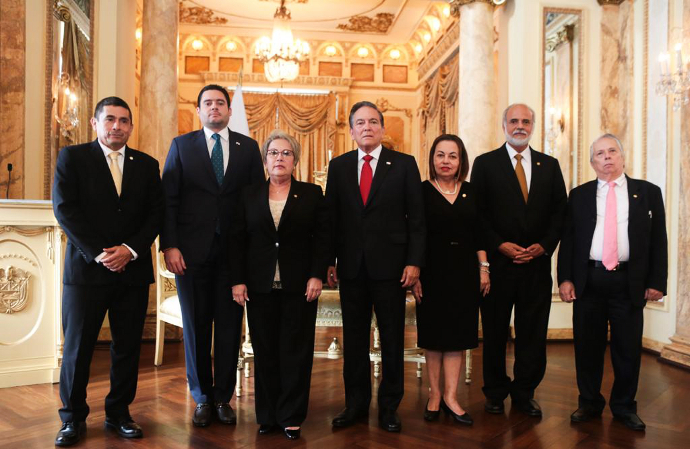The president and vice president and the new magistrate, María Eugenia López Arias, between them. Also taking office were alternate magistrates (suplentes) Carmen De Gracia, Miguel Espino, Olmedo Arrocha and Juan Francisco Castillo. Photo by the Presidencia.
Here come the new judges
by Eric Jackson
On December 5 a major power shift got underway on Panama’s Supreme Court of Justice, or so it would seem at a glance. A new magistrate and four suplentes took office as of that date, although the holidays may prevent them from doing much before January.
Inaugurated were magistrate-in-chief María Eugenia López and her suplente Juan Francisco Castillo, who will serve on the penal bench. Also installed were suplentes Rafael Murgas Torraza and Miguel Espino, to fill vacancies in those posts on the administrative and civil benches respectively.
If this is to be a change in how the courts work rather than just new riders on the gravy train, a profound transformation could be getting underway. Coming in January will be magistrates Maribel Cornejo Batista and Carlos Vásques Reyes, plus their respective suplentes, Otilda Vergara and José Agustín Delgado. López and Cornejo, plus their suplentes, take a two-thirds majority on the high court’s penal bench beginning in January. A lot of high-profile criminal matters arising from political corruption during the Martinelli years are on appeals that may get to this panel, but some of them on constitutional claims that might involve a full nine-member panel. The involvement in some of those cases of some of the magistrates and suplentes being replaced and their various conflicts of interests they may have are likely to put the new alternates in position to vote on some of the burning issues of the day.
There are also other major civil and administrative cases that the court has delayed. which include whether recognition or non-recognition of same-sex marriages is constitutionally proper in Panama. Vásquez will go to the court’s administrative bench, while there will be two new suplentes to fill vacancies on the civil bench.
Historically, certain administrative tasks are devolved to suplentes to handle, and they also often sit on lower appeals court panels. With some highly questionable lower court rulings that generally have the effect of impunity for public corruption, some of the new alternates may be in positions to play roles in the reversal and perhaps removal of trial court judges. That is, if there is a will and if there are firm enough legal bases to reform the judiciary from within.
President Cortizo consulted the traditionally respectable authorities that have mostly been ignored in high court appointments in this century, hired a US consulting firm to screen the applicants and at a December 5 ceremony told the new jurists to do the right thing and promised not to interfere.
During the Martinelli regime tourism minister Salomón Shamah, now living in Colombia with no expectations that he will come back to Panama, would be sent to the high court with presidential instructions, generally relayed through impeached and jailed but now out and practicing law felon Alejandro Moncada Luna. There are some spins on the Varela Leaks cell phone text messages that former president Varela also ordered the courts to do things, but so far a closer reading just reveals that he took an interest in these matters but did not tell the Supreme Court to do anything. (Varela’s communications with the attorney general and the comptroller general, however, appear to be a bit more damning.)
Contact us by email at fund4thepanamanews@gmail.com
These links are interactive — click on the boxes












